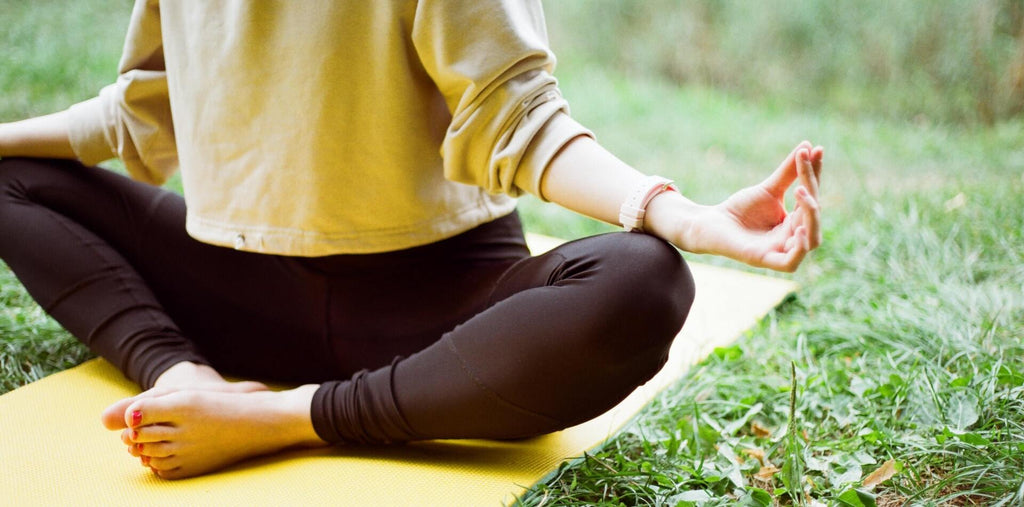Meditation: Your Ultimate Guide to Destress in a Busy Life
Our modern life is full of stress, sleepless nights, and tiredness, especially when we decide to focus on career growth. Meetings, deadlines, and burning projects are things that most of us face daily. All of these take a toll on our bodies and minds. People working in busy environments will feel the effects of this lifestyle the most. However, even those who work from home or have flexible schedules can experience high stress and tiredness.
What can you do to combat the effects of living in a fast-paced world? Achievers should focus on their mental health and invest time into it just like they would with physical health. You can do it by scheduling time off work. That way, you won't be constantly reminded of work and only spend time on necessary tasks for achieving your current goals. But mental recharge and rest are equally essential - and meditation is among the most effective practices for achieving your zen.
Effects of mental strain on your productivity
Stress and strain on your mental health can have detrimental impacts on the quality of your work. The even greater danger is that you may not notice it until it's too late. Suppose you're worried about your productivity when you're sick. In that case, we have bad news for you - because depression and strain may impair your efficiency even stronger. Institute for Health Research study claims that depression-related productivity loss is higher - up to 47% - than physical disease-related.

Another research from Harvard Medical School shows that 47% of depressed people report impaired productivity. In comparison, 70% have trouble focusing on a task. Meanwhile, the effects are not only mental but also physical, with high levels of stress reportedly causing damage to your immunity, heart health, and energy levels.
When you are under stress, your brain releases cortisol. This hormone helps regulate metabolism, inflammation, and cardiovascular activity. When cortisol levels increase, it could lead to an inflammatory response linked to depression. Achievers who experience chronic psychological distress tend to make more mistakes than those who do not, report the American Journal of Psychotherapy study. An important reason for this is the distraction caused by worry and anxiety over thoughts and emotions.
So if you want to keep your productivity stable & maintain your mental health, you need an approach that will fit your lifestyle. A practice like meditation that is time-saving yet effective may be what you're looking for! So let's look deeper into it and define how it may help you wind down and stay on top of your performance.
Benefits of meditation: the practice of monks or a trending stress-relief ritual
In this day and age, there's no shortage of distractions. We are constantly flooded with information from social media to the ever-pending deadlines. Work-related and daily stress is something that many of us have to deal with regularly. To combat this, many people turn to medication to help them relax.

Meditation, which comes from the word "meditate" and means 'to think deeply about something, has been around for thousands of years. Skeptics may see it solely as a practice for Tibetian monks, though statistic doesn't agree with them. People often forget that meditation is not just for monks to use as part of their religious practice. In this day and age, we can now harness its power to be more productive in our work and personal life.
Meditation is an absorption technique that can provide both bodily and mental peace. It helps in fostering management of emotions, perception of your environment, stress relief, anxiety alleviation, and slowing down drifting thoughts. A good understanding of how meditation precisely affects your emotions is crucial in living a fulfilling life now and in the future with the increasing amount of responsibilities on daily basis.
Some people believe that meditation is the key to achieving balance in life. According to the CompareCamp survey, around 500 million people worldwide practice meditation. Undoubtedly, there are many benefits for those who meditate regularly, and some people even claim it can change your life. So let's discover which perks meditation may bring to your life!
Meditation may help you build a wall between your mental health and stresses
In today's world, we are constantly exposed to messages of "go go go." Our lives are full of events, emails, and news that it is not easy to switch off and relax. We're all constantly striving to be the best we can be, but how many of us are actually taking the time to care for our mental health? But with meditation, we can learn how to let go of the stress that builds up in our lives and find peace.

Did you find that your work life is beginning to take its toll on your sanity and ability to carry yourself healthily? It might be a good idea to take some time out for you. You may find that meditation will help you build a wall between your mental health and stress. It's a solution that may differentiate your self-esteem and self-attitude from the ups & downs that may happen at work.
The Journal of Positive Psychology study says that practicing mediation may help you increase your self-esteem. It, in turn, will help you judge yourself and your decisions without excessive emotions and possibly avoid depression or burnout.
Meditation could support and strengthen your memory
One of the most powerful benefits of meditation is improving memory. Scientists claim it may enhance working memory, which refers to the part of your brain that you use for mental tasks such as math and reasoning and long-term memory.
The working memory improves due to relaxation and focus, which can help you stay calm and focus on the information you need. In addition, a clear mind will allow for better cognitive processing when it comes to information retention.

Effects of meditation not only improve your ability to learn how to do something new but also helps pertain the memories from your past that may be lurking in the depths of your mind. By practicing mediation, you may create long-term memories and boost your brain's capacity for storing information.
Meditation could be a potent stress-relief solution
When we're feeling stressed or anxious, it can often feel like there's no way out. We might not know what to do with the anxiety and fear. Meditation is one of the most effective yet most straightforward things you can do to reduce stress and enhance your mood. It's an active process that requires focus. Still, by finding the time to meditate every day - even for just a minute - you can improve your overall mood and reduce stress levels.
The benefits of meditation are not limited to reduced stress levels and enhanced mood. Research has shown that consistent meditation reduces anxiety, depression, and fear. During meditation, your brain releases endorphins due to this type of relaxation activity and enhances your mood.
Meditation may skyrocket your creativity and boost your imagination
Achievers and creatives have long used the power of meditation. Numerous studies have found that meditation can increase creativity and boost imagination. These are just some of the reasons why many agencies, freelancers, creative companies, and individuals embrace these types of practices to help them get better at what they do.

Many people may think that practicing meditation will not be effective because they are too busy or cannot find the time. However, there are many more benefits than one might expect from this practice. For example, it can give you a sense of relief from stress and anxiety, which in turn gives you the ability to generate new ideas.
Meditation is a way to focus on the present and enjoy the moment
Most of your happiness is buried in the past or future. Still, there are ways to train our brains & develop mindfulness. One way is through meditation; even if it takes a lot of time for you to start feeling the benefits, it's worth it.
Some people might have difficulty understanding what meditation does to your brain because we still haven't understood all its mechanisms. But using meditation as a form of therapy has impacted people's mindfulness.
There are many studies done on the different aspects of meditating and its relation to your well-being, but one thing's for sure. Meditation offers an effect on your brain functions that affects your current moment - staying with whatever you're doing at this precise second and achieving enhanced mindfulness levels.

It may help you enjoy more what you have and think less about the things that are too distant at the moment. You may find more happiness in your job, hobby, or simple routine like cooking or walking with your dog.
Now, when you know how many benefits meditation can bring to help your career & personal growth, it's time to start adding it to your schedule. You can find the top-5 quickest mediation techniques that you can try everywhere in our previous article! Meanwhile, we'll focus on specific steps to help you develop a meditation habit even though you're always low on time.
Step-by-step guide on turning meditation into your daily habit
We used to think that changing ourselves or making a change permanent it like starting from scratch, which demands a heroic gesture. But the truth is that when something becomes habitual, outside sources are no longer required for propelling the behavior onwards.
New habits must be built step by step, then every successful repetition leads us automatically to the next one. With physical practice, mental mastery deepens as time passes, transforming any worthwhile endeavor into a routine action that you can reliably count upon in moments of need. That approach works for meditating as well.

1. Find a type of meditation that fits your goal & schedule, then set a time for it
Meditation is known to affect your mental health and brain functioning positively. You may be wondering what type of meditation will suit your busy schedule and skill-set. An easy way to determine the type of meditation that would best suit you would be by parsing any opposing thoughts or emotions you're having while doing it.
For example: If you feel overwhelmed, stressed out, or anxious while trying to meditate, then you would look into choosing a more focused kind of meditation, such as regulated breathing exercises. Plus, define how much time you may spend each day on reflections. Even 5 minutes would be enough to start - gradually, you can prolong your meditation ritual. Then pick a particular time for each day when you'd like to drift away and wind down - be it early morning, lunch break, or a pre-bedtime.
2. Don't be afraid to practice meditations wherever you are
When you're in a rush or spend most of your day sitting in the office, you may think it's impossible to find some time to meditate. But the most remarkable thing about meditation is that you can practice it anywhere! With the advancement of technology, there are more and more opportunities for you to indulge in some form of meditation at any time. There are so many apps and tools that guide you through all meditation stages whenever you're practicing it.

Practicing meditation at the office can help you focus and reduce stress. It can also help you find deeper meaning in your work. As for the walk, it is essential to include a natural pause by taking a deep breath or simply turning around if anything catches your eye. It gives you a moment of peace and clarity that can potentially change the entire mood of your day. Lastly, an idea for bedtime is to do some form of mindful breathing exercises like breathing mindfully through the nose or the mouth with eyes closed until either falling asleep or before waking up.
3. Help your body & mind wind down during meditation with the help of supplements
Meditation is an essential tool in healing your mind, body, and soul. Different types of meditation are helpful for other goals. However, many people still find it challenging to meditate. Supplements can help enhance consciousness and connection to the natural world to aid your mediation. Plus, supplements may help soothe stressed minds and tune in for more effective meditation when taken in advance, such as an hour before meditation.
You can try herbal supplements like ashwagandha, ginseng, or Ginkgo Biloba for a more effective stress-relieving meditation. Such supplements as vitamin B12 and biotin may strengthen your neural system, enhancing the effects of meditation on your mental health. They will help you reduce anxiety and keep a cool head during mindfulness practices.








